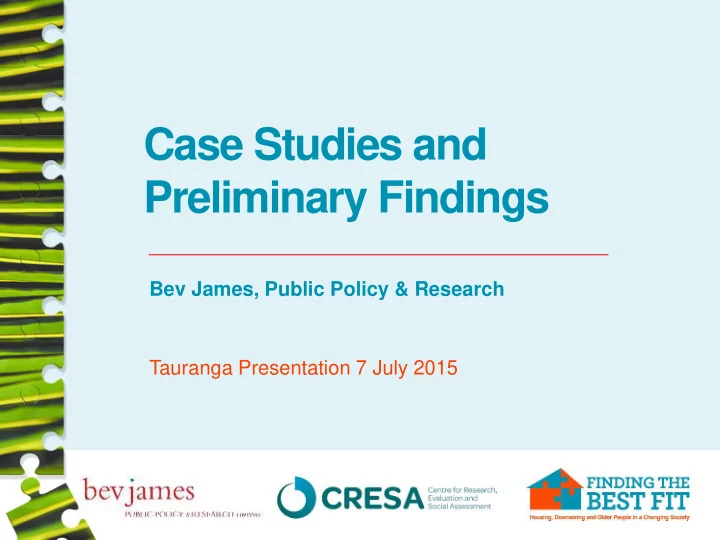

Case Studies and Preliminary Findings Bev James, Public Policy & Research Tauranga Presentation 7 July 2015
The Case Studies U nderstanding older people’s housing: • Housing experiences and needs • Housing choices • Circumstances that prompt or inhibit downsizing • Local and regional differences
Case study areas Top of the South – Marlborough, Nelson Bay of Plenty – Tauranga, Kawerau Wellington Hawkes Bay – Māori Older people affected by leaky building syndrome
Interviews with older residents Aged 55+ Those who have downsized Those considering downsizing Those aged 75+ who have not downsized
Interviews with Service Providers • Providers of services for older people, e.g. health services, MSD, home support services, churches • Age Concern and Grey Power • Councils • Lawyers • Property managers, landlords, housing providers • Building companies, real estate agents • Financial services, e.g. banks, Budget Advice
Meaning of downsizing • Moving from larger to smaller dwelling and/or section • Having less to worry about • Reducing consumption • Divesting possessions • Changing lifestyle • Pressure to downsize • When to downsize
“It means we can afford to live a bit longer! Rather than wait until one falls off the perch, we want to find somewhere suitable for us both. We're getting rid of things we don't want so the one left doesn't have to do it. Spend some money on ourselves, don't leave it too long. We want to have a little bit aside so if we want to take off for trips, we are able to”.
Downsizers are looking for • Warmth • Independence • Maintenance-free home and section • Cheaper running costs – utilities, rates, insurance, maintenance, transport • Handy to services • Some space • An outlook
Information needs • Strong reliance on getting information and advice from family and friends • Strong reliance on own knowledge and experience • Almost no use of professionals for advice • It’s hard to find information • Internet use – either nil or a lot • Reluctance to seek advice • Seeking advice indicates ‘failure’ and dependence
Barriers • Very few housing options • Dominance of larger homes in the market – limitations on building/ buying /renting smaller homes • Cheaper options may be in undesirable areas • Financial constraints on changing housing • Houses not designed for older people’s needs and preferences
Has downsizing worked? • Often moving when other life changes happening, so impacts are difficult to separate – e.g. retirement, health problems, loss of partner • Downsizing can increase costs; and there are some unexpected costs • Divesting possessions – both good and bad experiences
Similar issues for older rural dwellers • Lack of information and advice on housing options • Lack of age-appropriate, affordable dwellings • Financial constraints
Housing issues for older rural dwellers • Expectation that older people will move away • Downsizing is often tied up with farm succession • Costs of repairs and maintenance of home and infrastructure higher • Interest in more housing around existing settlements • Competition from 2 nd home owners
Service issues for older rural dwellers • Few or limited services and problems of critical mass: • Home support options and workers • Health care • Rest home and respite care • Social, companionship • Smaller volunteer pool and difficulties in recruiting • Loss of ability to drive is key decider to move
Virtual Village • Potential for people in smaller settlements to set up their own support networks? • Keep living in your home and neighbourhood • Services - social, recreational, educational, repairs, care, transport, utilities minder, insurance • Link to existing services and/or develop new services
Recommend
More recommend